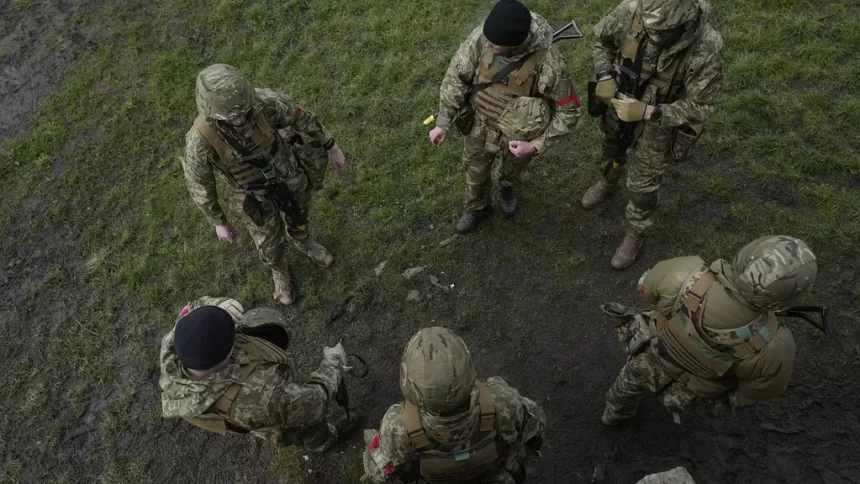A member of the British armed forces has been arrested in Kenya, with the United Kingdom’s military police now conducting a formal investigation into the matter. While the UK Ministry of Defence (MoD) has not released the details of the alleged offence, multiple British media outlets, including the BBC, have reported that the soldier is accused of rape.
In a brief statement issued Sunday, the MoD confirmed the arrest: “We can confirm the arrest of a Service person in Kenya. As the matter is the subject of an ongoing investigation by the Defence Serious Crime Command, we will not comment further.”
The arrest has reignited long-standing tensions surrounding the presence and conduct of British military personnel stationed in Kenya. The UK-Kenya Defence Cooperation Agreement permits the British Army to deploy thousands of soldiers annually to the East African nation for military exercises and training missions. Currently, approximately 200 British troops are permanently based in Kenya, focusing on training local forces.
Shadows Over Nanyuki
The latest incident has stirred memories of past controversies tied to the British Army’s training base near the Kenyan town of Nanyuki. For years, some Kenyan citizens and activists have voiced growing frustration over alleged misconduct by foreign troops stationed there. These concerns intensified following the unresolved case of Agnes Wanjiru, a 21-year-old Kenyan woman whose 2012 death remains a symbol of injustice.
Wanjiru was last seen alive in the company of British soldiers after leaving a local bar near the Nanyuki camp. Her lifeless body was discovered days later in a hotel septic tank. Despite persistent campaigning by her family and widespread media coverage, no one has been charged over her death. The case remains open, and its slow progress continues to frustrate human rights advocates and Wanjiru’s relatives.
In a significant gesture earlier this year, UK Defence Secretary John Healey met with Wanjiru’s family during a visit to Kenya. Healey pledged his support in their quest for justice, stating that the UK government would “help the family secure the justice they deserve.”
Investigations and Accountability
Amid rising scrutiny, the British Army has launched an internal inquiry into broader allegations of misconduct by its personnel operating in Kenya. The Ministry of Defence insists that all deployed forces receive explicit directives regarding appropriate conduct, both during and outside of official duties.
“All British personnel in the country have clear direction about how to behave, on and off duty,” the MoD reiterated in a recent statement. “They must complete mandatory training and attend compulsory briefings on conduct. We will have zero tolerance for unacceptable behaviour.”
However, for critics and observers, these assurances are beginning to ring hollow.
A Pattern or a Problem?
This most recent arrest adds to a growing body of concerns that military training deployments—particularly in foreign countries—are not being managed with the requisite cultural sensitivity, oversight, or accountability.
Kenyan civil society groups argue that the incidents involving British soldiers are not isolated, but indicative of a broader pattern of impunity. “We’re not saying all soldiers are problematic,” said one local activist in Nanyuki, “but when incidents happen, the question becomes: what happens next? Who is held responsible?”
While the Defence Cooperation Agreement between the UK and Kenya lays out clear jurisdictional procedures, activists argue that these frameworks often favor the British side, with military investigations being slow and opaque.
Diplomatic Tensions Brewing?
Though the Kenyan government has not made a formal public statement regarding the latest arrest, the situation places diplomatic pressure on both Nairobi and London. Any perception of mishandling could inflame public sentiment and threaten the goodwill underpinning military cooperation between the two countries.
Diplomatic insiders suggest that behind closed doors, Kenyan officials are seeking assurances that the UK will not only investigate but also prosecute any wrongdoing swiftly and transparently.
Justice Delayed, Confidence Diminished
For many in Kenya, especially those in communities near British military bases, the issue now transcends individual cases. It’s about trust, transparency, and whether the longstanding UK-Kenya military partnership is operating with the accountability it demands.
The arrest of the British soldier, while still under investigation, has already rekindled painful memories and brought renewed attention to unresolved grievances. As the Defence Serious Crime Command delves deeper into the current allegations, all eyes are on the British military establishment—not just to discipline the guilty if found responsible, but to restore faith in a system that many believe has long fallen short.
Whether this latest incident becomes a turning point or simply another headline remains to be seen.

